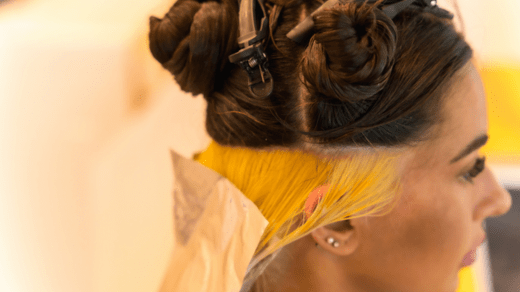Changing your hair color has become a common practice, whether to follow a trend or simply to feel good. However, a growing question arises: how can we dye our hair while respecting both our health and the environment? This is where plant-based hair coloring comes in. In Europe, this natural alternative is booming, attracting more and more people looking for a gentler, eco-friendly solution.
1. Composition: Nature vs. Chemistry
If you’re someone who checks ingredients before buying a product, you’re going to love plant-based hair coloring. Unlike chemical dyes, which are often filled with aggressive substances like ammonia and peroxide, plant-based hair dyes are made from natural ingredients such as henna, indigo, or cassia. These natural components not only provide beautiful color, but they also offer beneficial effects for your hair, strengthening and nourishing it.
On the other hand, chemical hair dyes alter the internal structure of the hair by opening the cuticles and penetrating the hair fiber. Over time, this can weaken and dry out your hair, making it prone to breakage. In contrast, plant-based dyes coat the surface of the hair with pigments, without damaging its structure. This process protects the hair and even helps it become more resilient to environmental factors.
2. Respect for the scalp and the environment
If you’ve ever experienced itching or redness after using a chemical hair dye, you’ll quickly understand why plant-based hair coloring is a welcome alternative. The natural ingredients in plant-based dyes are gentle, making them suitable for people with sensitive scalps, as well as those with psoriasis or eczema.
Beyond the personal benefits, plant-based dyes are also much kinder to the environment. Here are some reasons why:
- Biodegradable ingredients: Unlike chemical products, plant-based dyes do not release harmful toxins into the water or air.
- Less toxic waste: The manufacturing processes for plant-based dyes produce far less hazardous waste.
- Sustainability: Many plants used in these dyes are cultivated sustainably, contributing to the preservation of biodiversity.
In an era where consumers are becoming increasingly conscious of their environmental footprint, the eco-friendly nature of plant-based hair coloring is a huge advantage.
3. A growing trend in Europe
The trend toward plant-based hair coloring is gaining momentum across Europe. Consumers are looking for healthier, more natural alternatives to chemical dyes, and plant-based coloring fits perfectly with the rise of eco-conscious lifestyles. As the beauty industry shifts towards more ethical and sustainable practices, many brands, like Tresse Paris, have emerged to meet this demand.
Not only are individuals embracing this trend, but salons across Europe are increasingly offering plant-based coloring services. From Paris to Berlin and London, eco-conscious clients are choosing natural products for both personal and environmental reasons.
4. Varied and long-lasting aesthetic results
A common misconception is that plant-based hair dyes only offer a limited range of colors. However, these dyes can produce a variety of shades, from golden highlights to deep browns and even subtle reds. The ability to mix and match plant pigments means that you can achieve a customized color that suits your personal style.
One of the main advantages of plant-based coloring is its longevity. Unlike chemical dyes, which can fade unevenly and leave obvious root growth, plant-based dyes fade gradually and naturally. This ensures that your hair looks healthy and well-maintained, even as the color begins to soften.
5. Conclusion: a method on the rise
Choosing plant-based hair coloring is more than just a beauty trend; it’s a decision that benefits your health, your hair, and the environment. With an increasing number of people in Europe turning toward natural beauty products, this gentle alternative is poised for continued growth.
If you’re ready to make the switch to plant-based hair coloring, you’re choosing not only a better option for your hair but also a more sustainable, eco-friendly lifestyle. Your hair and the planet will thank you!

